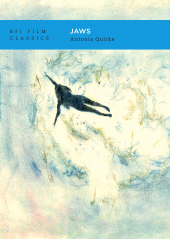Jaws
104 p.
This study of "Jaws "(1975) examines how Steven Spielberg's breakout film not only redefined the thriller but also pioneered the summer blockbuster, cementing his reputation as a master filmmaker. Against the odds of a catastrophic location shoot, 27-year-old Spielberg delivered a film so effective that it became the highest-grossing movie of its time, transforming Hollywood's approach to event cinema.Adapted from Peter Benchley's best-selling novel, and Steven Spielberg's second feature, "Jaws "became a cultural phenomenon, its story of a great white shark terrorising a New England beach town striking a primal chord with audiences. Under extreme pressure on a catastrophic location shoot, Universal's 27 year-old prodigy crafted a thriller so effective that for some time "Jaws "was the highest-grossing film of all time. It was also instrumental in establishing the concepts of the event movie and the summer blockbuster."Jaws" exerts an extraordinary power over audiences. Apparently simplistic and manipulative,
it is a film that divided critics into two broad camps: those who dismissed it as infantile and sensational - and those who saw the shark as freighted with complex political and psychosexual meanings. Antonia Quirke, in an impressionistic response, argues that both interpretations obscure the film's success simply as a work of art. In "Jaws, "Spielberg's ability to blend genres combined with his precocious technical skill to create a genuine masterpiece, which is underrated by many, including its director. Indeed, Quirke argues, it may be his finest work.In her foreword to this new edition, Antonia Quirke looks back on "Jaws", its compelling power and its contemporary resonances fifty years after its release. [Publisher's Text]
-
Informationen
ISBN: 9781839023651
REIHE
THEMENBEREICHE


